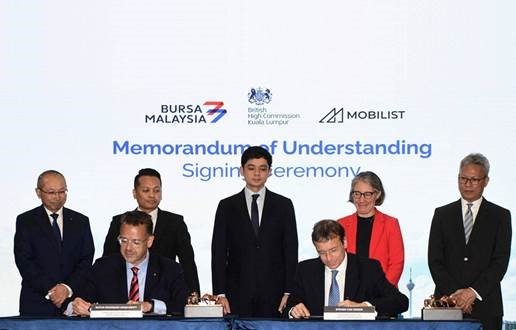
KUALA LUMPUR (April 16): Bursa Malaysia Bhd is collaborating with the UK government’s Mobilising Institutional Capital Through Listed Product Structures (Mobilist) programme to help address the funding gap needed in Malaysia to achieve the United Nations’ (UN) Sustainable Development Goals (SDGs) by 2030.
While the environmental, social, and governance (ESG) financing landscape in Malaysia is evolving and growing, Bursa Malaysia chairman Tan Sri Abdul Wahid Omar said it is not yet sufficient to address Malaysia’s urgent SDG needs and climate commitment targets, such as increasing renewable energy in the national energy mix to upto 31% by 2025, and to 40% by 2030.
"This collaboration will amplify our pursuit in driving innovation, ESG priorities and sustainable finance, for the betterment of Malaysia’s capital market and economy," he said at the signing ceremony of the memorandum of understanding between Bursa Malaysia and the UK government on Tuesday.
With a commitment to mobilise GBP (Great Britian pounds) 156 million of institutional capital flows into emerging markets, Mobilist is a flagship UK government programme that supports investment solutions that help deliver the climate transition and the UN SDGs in developing economies. To achieve this, Mobilist focuses on mobilising institutional capital to spur new scalable and replicable financial products.
Through the collaboration, Mobilist will work with Bursa Malaysia and its network of brokers, investment banks, and public offering promoters to pinpoint sustainable investment products by Malaysian companies that have aspirations to be listed on the exchange.
Apart from access to institutional capital, the collaboration will provide selected Malaysian companies with the technical assistance needed throughout the listing journey.
"We believe that solid issuers that will undertake fundraising exercises under the umbrella of the Mobilist programme will naturally have enhanced visibility and be of interest to investors and stakeholders focused on sustainable and inclusive growth," Wahid added.
Malaysia requires RM60b-RM90b in next 10 years for ESG projects
Minister of Natural Resources and Environmental Sustainability Nik Nazmi Nik Ahmad pointed out that in the next 10 years alone, Malaysia requires RM60 billion-RM90 billion to fund critical ESG projects, in order to be on track to achieving the UN SDGs by 2030.
These projects, Nik Nazmi said, encompass expanding public transportation, strengthening grid infrastructure, and upskilling the workforce.
"A crucial component will be a robust and adaptable grid to handle the increasing reliance on renewable energy sources. The estimated cost for grid development is likewise substantial, reaching RM180 billion by 2050, to accommodate Malaysia's clean energy ambitions," he said.
Furthermore, Nik Nazmi highlighted that an estimated RM1.2 trillion is needed between 2023 and 2050 to finance Malaysia's energy transition aspirations.
Citing the UN Conference on Trade and Development (UNCTAD), Nik Nazmi said that there is a US$4 trillion annual funding gap for developing countries to achieve the SDGs by 2030.
Separately, Asia's emerging market and developing economies need annual investments of at least US$1.1 trillion to meet mitigation and adaptation needs. At present, these economies are only receiving US$333 billion per year, he said.
As such, Nik Nazmi contended that developed countries like the UK must play their part in addressing the funding gap precisely, because they are wealthier and because they continue to benefit from the significant carbon sinks that exist in developing regions.
"Together, Bursa Malaysia's platform and Mobilist can create a powerful bridge. This bridge will connect promising sustainable ventures with the capital they need to thrive, enabling institutional capital to flow to firms tackling development challenges and climate transition.
"This will not only benefit our environment but also unlock new economic opportunities, creating win-win situations. Supporting climate action needs a whole-of-economy approach, and mobilising capital markets is an important piece of this puzzle," Nik Nazmi said.
Mobilist currently has partnerships with stock exchanges around the world, including the Philippine Stock Exchange, the Singapore Exchange Group, the Nigerian Exchange Group, and the Johannesburg Stock Exchange.
Proposals by companies to participate in the Mobilist programme must meet certain eligibility requirements including alignment with the UN SDGs, as well as demonstrating key commercial factors such as commercial readiness, feasibility, scalability, commercial viability, and replicability.
Source: https://theedgemalaysia.com/node/708127

